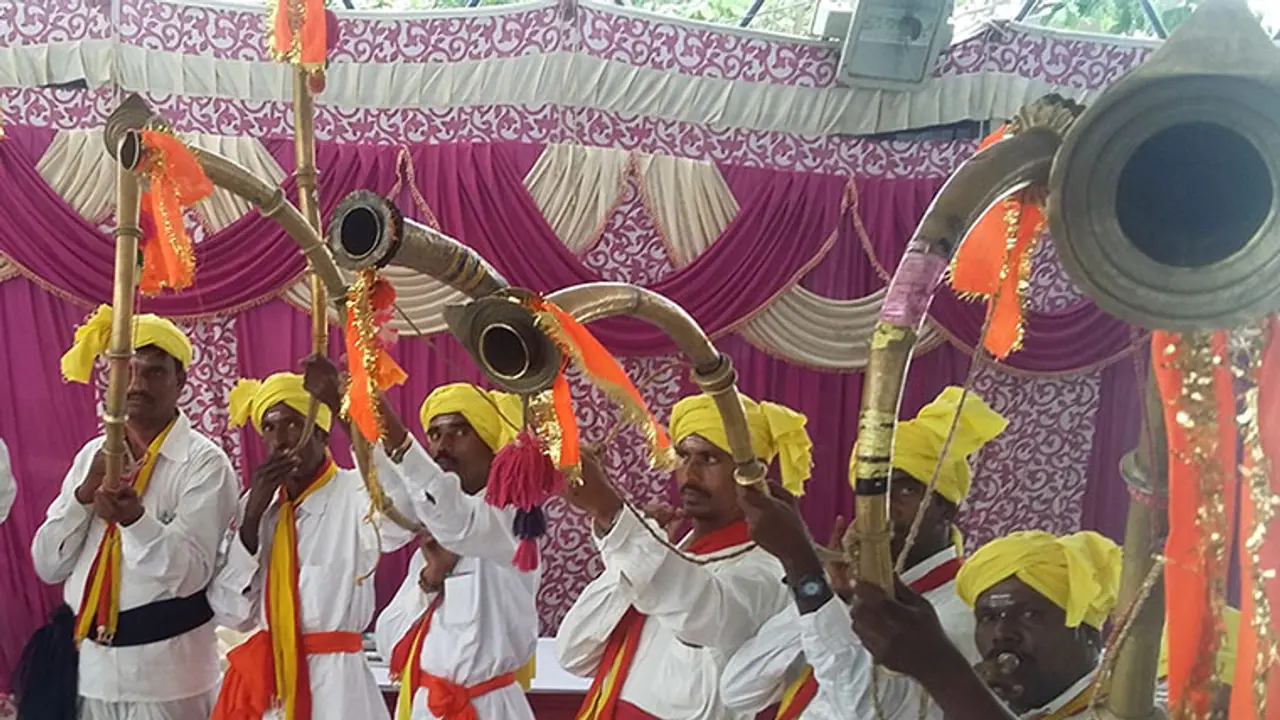Most Kannadigas are aware of the brave tale of Obavva, but few know of her descendants. Hanumantha, the great grandson on Obavva, maintains the tradition of playing the Kahale.
Few Kannadigas are unaware of the brave tale of Obavva, the wife of Kahale Mudda Hanuma, a guard at the mighty Chitradurga fort during the rule of Madakari Nayaka, in the 18th century.

During the rule of Madakari Nayaka's rule, Hanuma's job was to blow the Kahale (a loud, traditional horn) to alert the kingdom, in the case of an emergency.
At the time, the soldiers of Hyder Ali of Mysore tried to sneak into the fort through an overlooked tiny gap in the rocks that formed the fort's wall.
The gap required the soldiers to make an arduous climb and crawl through the hole one at a time. Noticing this, Obavva famously slew scores of the soldiers, one at a time, by smashing their heads with a pestle, as they crawled through the gap.
While the tale of Obavva has become part of Karnataka's folklore, very few people are aware of her descendants, who still keep the family tradition alive. That is, blowing the Kahale, not slaying invading soldiers.
 Hanumantha, aged 77, is the great grandson on Obavva and Kahale Mudda Hanuma (her husband). He has maintained the tradition of his great-grandparent of playing the Kahale.
Hanumantha, aged 77, is the great grandson on Obavva and Kahale Mudda Hanuma (her husband). He has maintained the tradition of his great-grandparent of playing the Kahale.
The Kahale was not only an instrument for emergencies. It was played on more joyous occasions - like festivals or victory over rivals and other good news. However, this tradition gradually fell out of favour in other parts of Karnataka. Today, it is mostly concentrated in Chitradurga and parts of Maharashtra now.
Although many of those his community chose different professions and migrated to cities, Hanumanthappa and his family decided to stay back at Chitradurga and continued to train others in the ancient art.
"Our forefathers were loyal to the Chitradurga kings and were placed at the top of the hills as guards. The Kahale man's job was to alert the army by blowing the horn in case he spots enemies. Hence our family played a major role in history, " he said.
Somashekar, a graduate and the elder son of Hanumanthappa, says: "The government is also taking a keen interest in saving and popularising Karnataka history and culture. And Kahle is a significant part of that."
Speaking about his children, he mentioned, "Though we play the Kahale, our children are educated. My son is studying a diploma in electronics and communication in the Chitradurga government polytechnic college."
On the needs of playing the horn, he said, "In this art form, we have to keep yourself fit both physically and mentally. We focus on rhythm,"
Hanumanthappa's younger son, Kantaraj, who is a double degree holder says: "We have kept our traditions alive and at the same time we also work on our farm land. We are paid ₹2000 for every programme by the Kannada and cultural department of the state."
Dhananjaya, a grandson of Hanumanthappa, who understands the importance to keep this tradition alive, opined "Whenever I have holidays, I come and give these programs."
Caste divide still exists:
However, the artists who keep such traditions alive continue to be disappointed with the existence of the caste system. They and say even to this day few people who invite these Kahale artists practice unfair religious practices.
"We belong to Chalavadi community, and we are treated badly in a few places. At several places, we had to struggle to get drinking water," said Dhanajaya.
